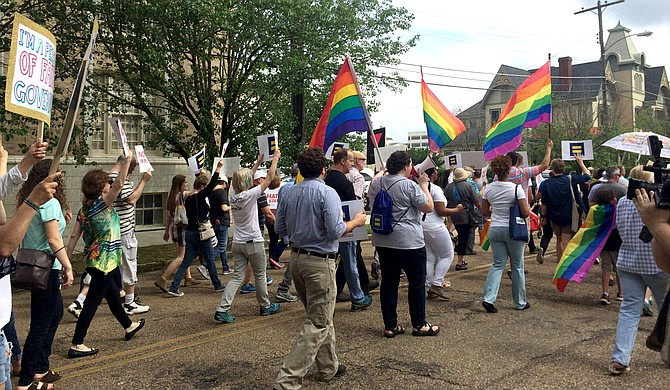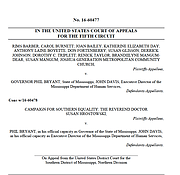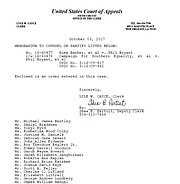Protesters rally in downtown Jackson on May 1, 2016, calling on Gov. Phil Bryant to repeal House Bill 1523. He did not comply, however. Photo by Arielle Dreher.
JACKSON — The "Protecting Freedom of Conscience from Government Discrimination Act" will become state law on Tuesday, Oct. 10, after the 5th U.S. Circuit Court of Appeals denied attorneys' request to prevent the law from taking effect while they petition the U.S. Supreme Court.
Attorneys representing several Mississippians and a church in the Barber v. Bryant case filed a 30-page motion to the 5th Circuit on Tuesday, asking the court to not allow the law, House Bill 1523, to take effect pending their petition to the U.S. Supreme.
"Although this Court reversed the district court on standing grounds, the law's constitutionality remains a pressing and unresolved question. Moreover, this troubling and unusual statute raises important standing issues, on which the Supreme Court is likely to grant certiorari and reverse," the petition filed Oct. 3 says.
The 5th Circuit gave no reasoning for denying the request, but Judge Jerry Smith signed the order on Tuesday, Oct. 3.
The order re-set the clock for the court to issue the mandate, Susan Sommer, an attorney with Lambda Legal representing the Barber plaintiffs said. HB 1523 will now become state law next Tuesday, Oct. 10.
Sommer told the Jackson Free Press that the attorneys were going to focus their efforts on filing a writ of certiorari petition to the U.S. Supreme Court, asking the high court to review the case. Even if the U.S. Supreme Court decides to look at the case, HB 1523 will stay in effect until a court decides differently.
"For us, that's the end of the line in terms of trying to get the stay," Sommer said. "We're going to focus our energy on asking the Supreme Court to accept our (petition)."
Rob McDuff, who also represents the Barber plaintiffs, submitted the petition for a stay with Sommer on Tuesday.
"Although I am disappointed that the Fifth Circuit is allowing this law to go into effect, I am glad we were able to block it for the last 15 months," McDuff said in an emailed statement. "We will continue to fight it and hopefully see the day when it is nullified once again."
The 5th Circuit did not address the constitutionality of the contents of the "Protecting Freedom of Conscience from Government Discrimination Act," opting to only rule on the issue of standing. It ultimately decided that the plaintiffs did not have standing to challenge the statute under the Establishment Clause of the U.S. Constitution.
U.S. District Judge Carlton Reeves has already revived proceedings in a separate lawsuit, which sought to legalize same-sex marriage in the state before the Obergefell decision in 2015, which could address if a part of HB 1523 concerning circuit clerks is constitutional.
Read more about HB 1523 at jfp.ms/hb1523.





Comments
Use the comment form below to begin a discussion about this content.
comments powered by Disqus